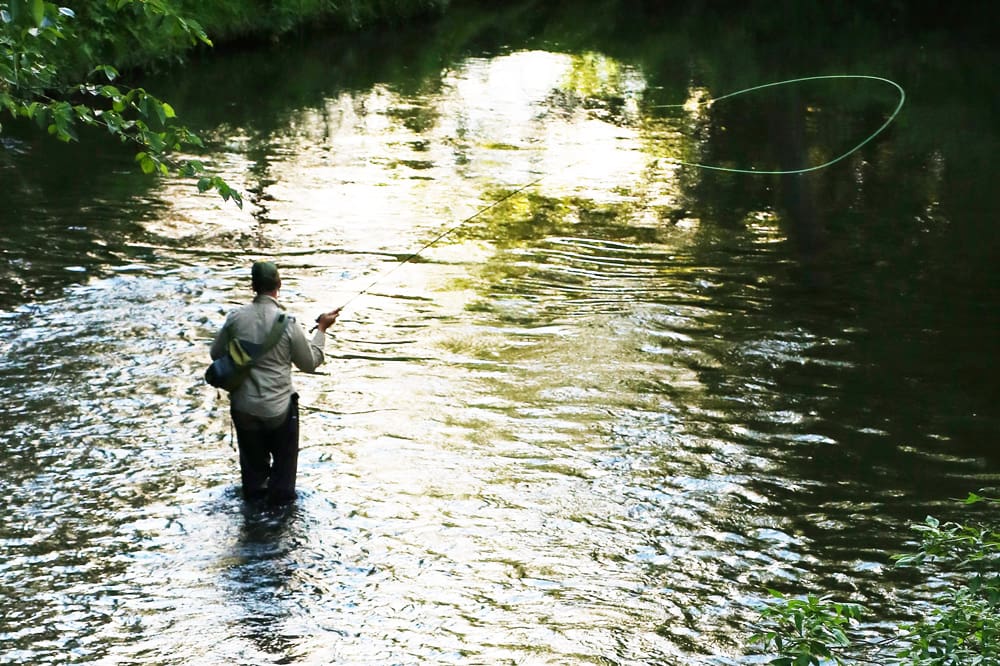My son, Joseph, is standing thigh deep in a cold wash of current that sounds like endlessly pouring a bucket of water onto a pile of stones. His half of the stream is shaded by a grove of old black walnut trees, from which a kingfisher has just dropped then swooped directly over Joe’s head, although he hasn’t noticed it.
Just upstream, our friend Paul lifts his fly rod, his line jumping from the taut surface of a deep run. The bright line forms an arc behind him, straightens, forms an arc ahead of him then falls like a tender whiplash back onto the water. It is a moment filled with attentiveness and longing, and an accumulation of devoted practice that in another context might be considered prayerful.
Joe’s head is bowed, although he is not praying. In fact, he is almost certainly cursing, in whatever inward language 13-year-old boys use to curse. Somewhere below the dark surface of the stream, a gold-bladed Mepps spinner hangs in the current, one hook sunk into a submerged branch.
Somewhere near his feet lies a scattering of brand-new lures and swivels that fell from his mini tackle box as he tried to simultaneously steady himself against the heave of the water, hold his fishing rod in his armpit and finger through the tiny compartments of sharp hooks in search of something to tie onto his snapped line.
My love for him is never more acute than when he is suffering, even the shallow suffering of errant casts and lost lures. He means his frustration to look black and threatening, but all I see is my boy, forlorn and a little embarrassed. Joe stares sulkily at the lures that remain, which seem to have lost all the speculative magic they had just last night, when he laid them out on his bed, removed them one by one from their packages and chose the precise compartment where each belonged.
Paul raises his arm high, and the tip of his rod bends and shivers for the fifth or sixth time today. Half a minute later, he crouches, lifts a wriggling brown trout from the water, twists the hook quickly from its jaw and lets it slide out of his hand.
I catch Joe glance up at this then drop his head back down to his tackle box. Of course what I want most in the world is to wade over to him. To stand next to him while we pick out his next lure together. To quickly tie it on for him and give him an I’ve-been-there shoulder pat. To walk him through all the steps that lead from his 13-year-old frustration to Paul’s elegant yet playful adult competence.
But one of those steps, it turns out, is this moment: its frustration and disappointment, its real-life incoherence, its requirement that he pick from among his sadly diminished set of spinners and make the best of it. It’s a tiny step in the direction of resilience, a step away from the natural entitlement of childhood.
As it turns out, we’re not really here to fish, when all is said and done, at least not entirely. We’re here to put in one day’s work in the raising of an American boy.
In the end, Joe picks a black and yellow Panther Martin that Paul gave him earlier in the day as he explained that he used to make $2 an hour babysitting and that after an evening of watching the neighbor kids, he could afford two Panther Martins, which he would use on this very stream until he lost them in trees or on underwater snags or sometimes in a big fish’s jaw when a badly tied knot failed.
“How’s it going, Joe?” Paul calls over the rush of the current.
Joe is absorbed in tying on his inherited lure — slowly, clumsily, carefully, but by himself. “Good,” he replies without looking up. A minute later, he resumes casting.
Later that day, he will catch his first fish. It will be a small brook trout, pulled with some skill from a complicated deadfall. He will hold it up, his stoic expression clenching down on a smile, as the fish twists acrobatically, a Panther Martin hooked in its lower jaw.





